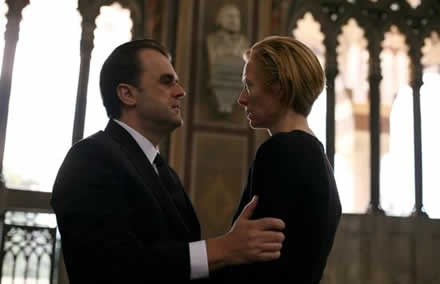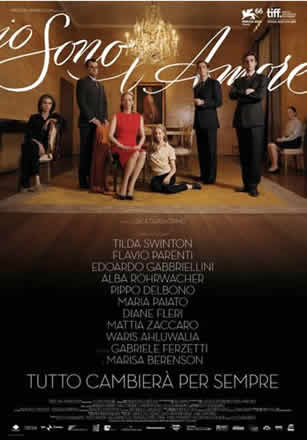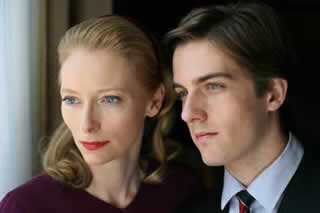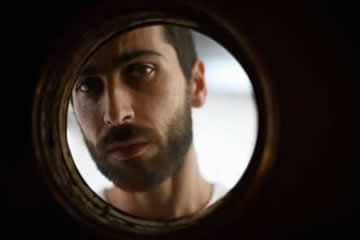 Luca Guadagnino joins supreme stylist Paolo Sorrentino (“L’amico di famiglia”) and Matteo Garrone (“Gomorrah“) in the renewal of Italian Cinema. Guadagnino’s exquisite melodrama “I Am Love” (“Io Sono l’Amor“) wow’s from its retro credit sequence to its last gothic coda. The ambitious melodrama recalls Visconti in its stately sumptuous design, Antonioni in its angst filled tracking shots and use of architecture as a “character”. Cinephiles will delight in its references to Michael Powell, Hitchcock, Ophuls and Sirk.
Luca Guadagnino joins supreme stylist Paolo Sorrentino (“L’amico di famiglia”) and Matteo Garrone (“Gomorrah“) in the renewal of Italian Cinema. Guadagnino’s exquisite melodrama “I Am Love” (“Io Sono l’Amor“) wow’s from its retro credit sequence to its last gothic coda. The ambitious melodrama recalls Visconti in its stately sumptuous design, Antonioni in its angst filled tracking shots and use of architecture as a “character”. Cinephiles will delight in its references to Michael Powell, Hitchcock, Ophuls and Sirk.
In a credit sequence reminiscent of Hollywood’s golden age, steep angled shots of snowy Milan play against John Adams’s nervous score. Kitchen staff, liveried waiters and Emma Recchi (Tilda Swinton), the glacial chatelaine of the imposing 1930’s mansion, scurry through the endless halls preparing for a sit-down dinner, celebrating the birthday of the Recchi clan patriarch Edoardo Recchi Sr (Gabriele Ferzetti). Ferzatti (“Once Upon a Time in the West‘) played spoiled upper class heroes in Antonioni’s “L’avventura” and “Le amiche“.
Emma’s control of her staff is military in it’s precision, all for the glory of her husband Tancredi’s family. One by one the family assembles. The heir Edoardo Jr. (Flavio Parenti) rushes in like a favored  young squire, greeted by the maternal housekeeper Ida (Maria Paiato).
young squire, greeted by the maternal housekeeper Ida (Maria Paiato).
On the surface, Russian born Emma seems to the manor born: mistress to the sumptuous showplace, charming to her guests, kind to the staff, affectionate with her three grown children, coolly deferent to the patriarchal males of the clan. She’s crafted a facade, replicating the aristocratic mannerisms of the Milanese elite, but intimate bursts of Russian) a secret language she shares with her favorite) “Edo” hints at her past.
As servants glide through the halls, the camera inventories the tapestries, the snowy linens, and the glittering chandeliers, illustrating the bourgeois traditions that will splinter by the film’s end. Edoardo Sr. shocks the family with his Lear-like pronouncement.
He will pass on his textile empire to both son Tancredi (Pippo Delbono), and beloved grandson Edoardo (Flavio Parenti).”It will take two men to replace me,” he proclaims, unsettling the exquisite surface of the celebration.
Edoardo has his own plans, bankrolling a country restaurant on the hillside Ligurian farm plot of innovative chef Antonio (Edoardo Gabbriellini). It’s unacceptable to the family, winners to a man, that Edo lost a rowing race earlier that day. Antonio, the victor (and Edo’s partner in the restaurant) delivers a cake as his consolation prize. He declines to join the party. On her way to bed, Emma meets the shy, passionate man whose charms will fragment her world.
 Other events rock the perfect calm. Fine artist Betta (about to jilt her boyfriend and reveal her lesbian lover) presents Edouardo Sr. with a framed photograph instead of her annual drawing. Edoardo’s displeasure is all too evident. Rituals are not to be broken in this affluent enclave.
Other events rock the perfect calm. Fine artist Betta (about to jilt her boyfriend and reveal her lesbian lover) presents Edouardo Sr. with a framed photograph instead of her annual drawing. Edoardo’s displeasure is all too evident. Rituals are not to be broken in this affluent enclave.
Emma discovers a CD and a picture of Betta’s girlfriend. Her vicarious joy in Betta’s love cracks Emma’s repressed shell, awakening the emotional working class identity she jettisoned when Tancredi brought her from Russia, one more artwork for his collection.
Eduaurdo Sr. dies. Family secrets begin to emerge. Edo wants to retain the old school family business, loyal to the workers and the region. High living Tancredo plans to sell to a multinational company intent on divesting the assets while developing the family name as a Global brand in the financial marketplace.
Yorick Le Saux’s prowling camera and Adam’s counter-intuitive score build a tense subtext. Nothing was written specifically for the film. Image and music are bound together, running like a river through your mind. Scenes of daily routine play against foreboding music, while the climactic scenes pay against sprightly, lighthearted music. The playfulness of the music points up the character’s irreversible acts. The pleasure before the fall.
A scene in a restaurant as Emma tastes Antonio’s cooking plays as the sensual foreplay which unleashes her life force. Lit in a close up that isolates her from the action, posed like a Madonna in a shrine to gastronomy, her expressions draw us in.
An Arcadian love scene is almost hallucinatory in its sensual pulsing life, recalling the celebratory erotic scenes in Czech films of the 60’s. The lover’s nude body parts blend with nature, insects, blooming flowers, stamens and pistols merge in mad love. Swinton’s ascetic body has never seemed erotic to me, but she blooms in this film.
After making love to Antonio, Emma sits in the refuge of her bathroom. Her hand cupped to her mouth, her eyes revisit all the moments of first love. We read every nuance, every wonderment. In one exhilarating sequence, Emma rushes through the mansion, filled with guests and servants, down flights of stairs, simply to kiss Antonio in the pantry where he’s preparing a special meal; a stolen moment in her brisk schedule of duties.
Guadagnino’s observations of his distressed family are clinical, miniaturist. The passions he unleashes are grandiose. I sat agape at his daring, as I once watched Sirk films, or Aldomovar’s melodrama “Matador“. Like Sirk or Losey, the camera dwells on the surface details, the opulence, the perfectly controlled family life of extreme wealth (as fetishistic as the Catholic Church) until it makes it’s point. Some things can’t be controlled. No matter how much ritual is thrown at it.
Swinton (Fluent in Italian and Russian) developed the project for seven years with Guadadigno. They worked together on “The Protagonists” (1999) and “Tilda Swinton: The Love Factory” (2002).
Marisa Berenson as the matriarch Allegra, Maria Paiato as the loyal housekeeper Ida, Alba Rohrwacher as Betta and Diane Fleri as Edo’s wife Eva make strong impressions, although their parts are underwritten.
Walter Fasano’s intuitive editing, Francesca Balestra Di Mottola’s opulent production design, Silvia Fendi’s chic costumes, the tightly woven music and image- all awaken our senses, making us complicitous in Emma’s “l’amour fou”. Le Saux’s camera clings to the actors, capturing micro gestures; dialogue plays backup to often-silent film acting. In the closer, characters speak through looks and body language, as Adam’s magisterial music swells and drowns them out. Subtle and baroque. DO NOT MISS ON BIG SCREEN! Laemmle Sunset June 18

